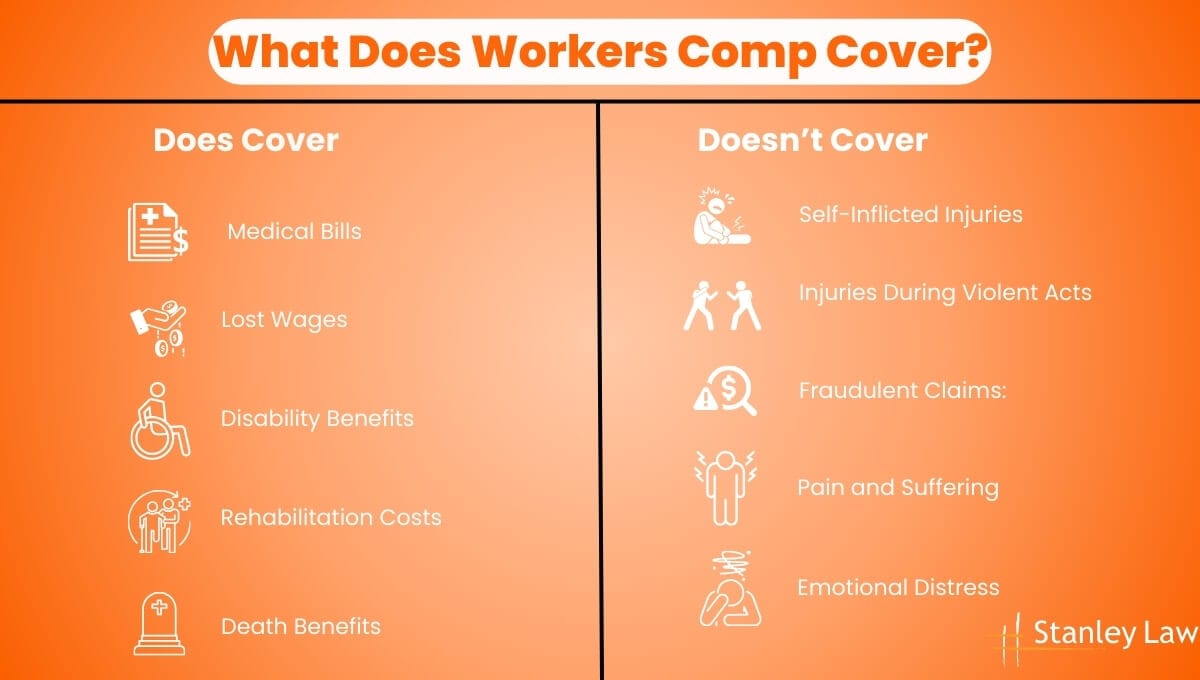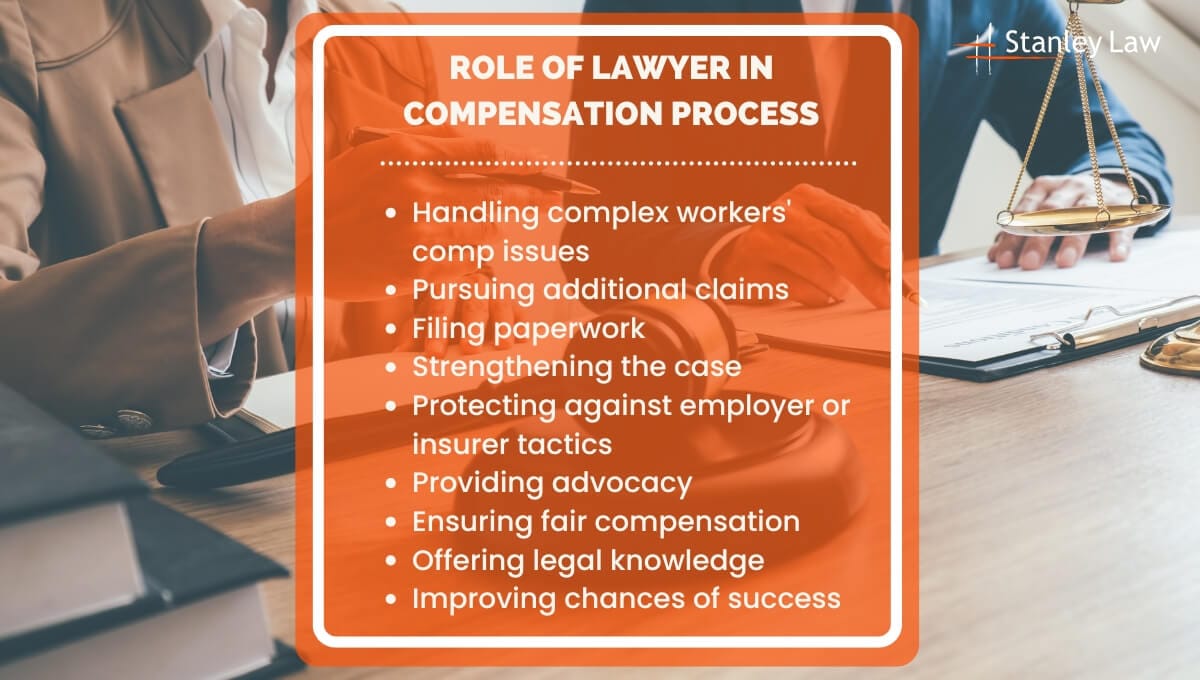Have you ever wondered, “Can I sue workers’ comp for pain and suffering?” You’re not alone. Many injured workers find themselves frustrated upon learning that workers’ compensation typically does not cover pain and suffering damages, which can include both emotional distress and a diminished quality of life. In this blog, we will explore the reasons behind these limitations and discuss alternative ways to seek the compensation you deserve for pain and suffering.
Understanding Workers’ Compensation
Workers’ compensation is crucial to protecting employees who suffer injuries or illnesses. It provides financial assistance and medical benefits, ensuring injured workers receive necessary care while protecting employers from lawsuits.
What is Workers’ Compensation?
Workers’ compensation is a form of insurance that benefits injured employees while performing their job duties. It is available to almost all workers, including full-time, part-time, and temporary employees, ensuring broad coverage across various employment types.
What Does Workers’ Comp Cover?
Workers’ compensation offers several key benefits, including:
- Medical Expenses: Coverage includes hospital visits, surgeries, medications, and any necessary rehabilitation to facilitate recovery.
- Lost Wages: If an injury prevents you from working, workers’ comp provides wage replacement benefits to help sustain your livelihood.
- Disability Benefits: In permanent disability resulting from workplace injuries, you may qualify for long-term disability benefits.

What Does Workers’ Comp Not Cover?
While workers’ compensation provides essential support, it does have notable limitations:
- Pain and Suffering: Workers’ comp focuses on tangible losses and does not cover intangible damages such as emotional distress or pain related to an injury.
- Self-Inflicted Injuries: Injuries resulting from a worker’s intentional actions are not covered.
- Off-Duty Injuries: Injuries outside work hours or while not performing job-related duties do not qualify for workers’ comp benefits.
Pain and Suffering in Legal Contexts
What is Pain and Suffering?
Pain and suffering encompass the physical pain, emotional distress, and psychological trauma that can result from an injury. These terms go beyond tangible losses, like medical bills or lost wages, to address the intangible aspects that degrade a person’s quality of life. This category of compensation is crucial for covering non-economic damages such as mental anguish, anxiety, and the diminished ability to enjoy life and partake in daily activities.

Can Pain and Suffering Be Claimed Through Workers’ Comp?
Under workers’ compensation, there is no provision for claiming pain and suffering. The system is designed to streamline the provision of benefits, focusing strictly on concrete losses such as medical expenses and lost wages. Workers’ comp can deliver quick and dispute-free relief to injured workers by excluding pain and suffering, contrasting sharply with personal injury lawsuits where such damages can be pursued. Personal injury cases allow for the recovery of pain and suffering, highlighting a significant difference in how these systems operate.
Alternatives for Seeking Compensation for Pain and Suffering
While workers’ compensation doesn’t cover pain and suffering, other ways exist to seek compensation for these damages.
Filing a Personal Injury Lawsuit
Filing a personal injury lawsuit is a viable method to seek compensation for pain and suffering. This option is applicable if someone else’s negligence caused your injuries. A personal injury claim can allow you to recover damages for pain and suffering, medical expenses, and lost wages. However, winning a personal injury case requires proving that another party’s negligence directly caused your injuries. This process often involves collecting substantial evidence, such as witness statements and expert testimony, to support your case.
Third-Party Claims
Third-party claims are another option if someone other than your employer caused your injuries. For example, if a contractor or an equipment manufacturer is at fault, you can file a claim against them. These claims can offer compensation for various damages, including pain and suffering, which workers’ comp doesn’t cover. Third-party claims are especially beneficial when injuries are due to faulty equipment, unsafe conditions, or negligence by a non-employer.
Legal Support and Expertise
Dealing with workers’ compensation claims and seeking additional compensation can be challenging. Experienced legal support ensures you’re fully protected and receive everything you’re entitled to.
The Role of a Lawyer in Your Compensation Claim
A lawyer is crucial when handling complex workers’ comp issues and pursuing additional claims, such as personal injury or third-party lawsuits. They assist with everything from filing paperwork to strengthening your case. Lawyers also protect you from employers or insurance companies that might attempt to minimize or deny your claims. With an experienced lawyer, you have a professional advocate who will fight for your rights and ensure you receive the compensation you deserve. Their in-depth knowledge of the legal system can help you avoid common mistakes and significantly improve your chances of success, especially when seeking compensation for pain and suffering.

Why Choose Our Law Office?
Stanely Law Office provides expert legal services on workers’ compensation and personal injury cases. We’re committed to getting our clients the best possible outcomes. Here are a few reasons to consider partnering with us:
- Expertise: Our team has years of experience handling workers’ comp and personal injury cases, helping clients secure maximum compensation.
- Proven Track Record: We have a strong history of winning cases and ensuring our clients receive the compensation they deserve.
- Client-Centered Approach: Your needs are our priority. We work closely with you throughout the claims process to ensure we address your concerns.
- Comprehensive Legal Support: From initiating your workers’ comp claim to managing complicated third-party lawsuits, we manage every aspect of your case.
- Dedication to Results: Our team fights tirelessly to secure the best outcomes for our clients, whether through settlements or in court.

Conclusion
Workers’ compensation provides essential benefits for medical expenses and lost wages but falls short when it comes to covering pain and suffering.
Fortunately, alternatives such as personal injury lawsuits and third-party claims offer avenues to seek compensation for these intangible damages. In such complex scenarios, legal representation becomes indispensable to ensure you receive maximum compensation.
Professional legal advice is essential if you’re dealing with the aftermath of a work-related injury and questioning whether you can claim for pain and suffering. At Stanley Law Office, we are dedicated to guiding you through the process, exploring all available options, and advocating for your rights.
Reach out to us today to discover how we can assist you in securing the compensation you rightfully deserve.
Contact us now to schedule a consultation and take the first step towards getting your needed support.
Can I Sue Workers’ Comp for Pain and Suffering: FAQs
How Do I Prove Pain and Suffering in a Legal Claim?
Accordion To prove pain and suffering in a personal injury lawsuit, you must show how the injury has impacted your physical and emotional well-being. This proof typically includes presenting medical records, testimonies from healthcare providers, and personal accounts detailing how the injury affects your daily activities and overall quality of life.
What Are the Common Mistakes to Avoid When Filing a Workers’ Comp Claim?
Avoid these frequent errors to ensure your workers’ comp claim proceeds smoothly:
- Forgoing Legal Advice: Consult with an attorney, particularly if your claim is complex or you are uncertain about your legal rights.
- Not Reporting the Injury: Always report your injury to your employer immediately.
- Neglecting Medical Advice: Seek medical attention promptly and adhere to the treatment plan prescribed by your healthcare provider.
- Missing Deadlines: Ensure all claim forms are filed on time and completed accurately.
Can I Appeal a Denied Workers’ Comp Claim For Pain and Suffering?
Since workers’ compensation does not cover pain and suffering, you cannot appeal a denial based on these grounds. However, if your claim was denied for other reasons, such as medical coverage or lost wages, you may appeal the decision to ensure you receive all other entitled benefits.
Is There a Statute of Limitations for Workers’ Compensation Claims?
Yes. In New York, you generally have two years from the date of the injury or from when you first became aware of the condition to initiate a workers’ compensation claim. Acting within this timeframe is vital to preserve your right to benefits.
How Long Can You Get Paid On Workers Comp In NY?
In New York, the duration for receiving workers’ comp benefits depends on the severity of your injury. Temporary benefits can last until you’re able to return to work. For permanent partial disability, benefits can last up to 525 weeks (approximately 10 years).

